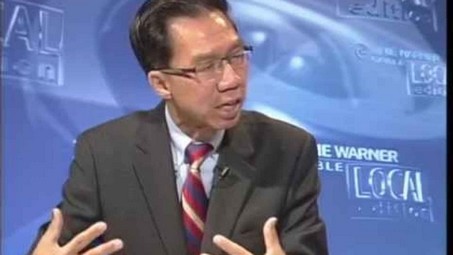California Dem Introduces Bill to Override First Amendment
Assemblyman Ed Chau (D-Monterey Park) has a modest proposal. And he proposes a lot of stuff.
Adult-use marijuana: marketing: packaging and labeling.
AB 383, as amended, Chau. Civil actions: discovery status conference.Existing law establishes the Civil Discovery Act, which governs the rules and procedures related to discovery in all civil cases, and specifies, among other things, the time for completion of discovery. The act authorizes a party to resolve certain discovery disputes by filing a noticed motion.Horse racing: parimutuel wagers.
Edible marijuana products: labeling.
The California Political Cyberfraud Abatement Act.
AB 1104, as introduced, Chau. The California Political Cyberfraud Abatement Act.Existing law makes it unlawful for a person, with intent to mislead, deceive, or defraud, to commit an act of political cyberfraud, as defined. Existing law defines the term “political cyberfraud” to include a knowing and willful act concerning a political Web site that is committed with the intent to deny a person access to a political Web site, deny a person the opportunity to register a domain name for a political Web site, or to cause a person reasonably to believe that a political Web site has been posted by a person other than the person who posted the Web site, and would cause a reasonable person, after reading the Web site, to believe the site actually represents the view of the proponent or opponent of a ballot measure. Existing law also defines the term “political Web site” to mean an Internet Web site that urges or appears to urge the support or opposition of a ballot measure.This bill would modify the definition of the terms “political cyberfraud” and “political Web site” to include Internet Web sites that urge or appear to urge the support or opposition of candidates for public office. The bill would also make it unlawful for a person to knowingly and willingly make, publish or circulate on a Web site, or cause to be made, published, or circulated in any writing posted on a Web site, a false or deceptive statement designed to influence the vote on any issue submitted to voters at an election or on any candidate for election to public office.
What does the California Political Cyberfraud Abatement Act involve? Glad you asked.
Section 18320.5 is added to the Elections Code, to read:
18320.5.
It is unlawful for a person to knowingly and willingly make, publish or circulate on an Internet Web site, or cause to be made, published, or circulated in any writing posted on an Internet Web site, a false or deceptive statement designed to influence the vote on either of the following:
(a) Any issue submitted to voters at an election.
(b) Any candidate for election to public office.
The First Amendment had its day. It was meant for the era of printing presses. Not the internet. I’m assuming that is the thinking here.
See More Here: https://legiscan.com/CA/people/edwin-chau/id/14096?status=introduced






